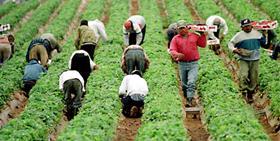
Post-referendum labour and skills shortages are starting to bite in sectors which employ a high number of EU nationals, according to a new report.
The latest Labour Market Outlook from the Chartered Institute of Personnel and Development (CIPD) and the Adecco Group suggests that, despite a near record number of vacancies – 748,000 according to the latest ONS data – UK employers are struggling to fill roles with the right candidates as a result of both labour and skills shortages.
Official ONS data from the report suggests that a fall in the supply of EU nationals may be playing a key role, with growth in the number of non-UK EU nationals in employment in Britain slowing sharply in recent months.
The figures, which are not seasonally adjusted, show that the number of non-UK nationals from the EU almost halved from an average of more than 60,000 per quarter in the nine months to June 2016 to just 30,000 in the three months to September 2016.
Low-skilled sectors are particularly affected with vacancies in retail and wholesale, manufacturing, health and accommodation, and food services make up almost half (45 per cent) of all empty jobs.
Agriculture has also been hit with NFU president Meurig Raymond warning that the sector is already experiencing labour shortages, which look set to get worse.It is estimated that 30,000 permanent workers and 67,000 seasonal workers are employed in agriculture alone.
Gerwyn Davies, labour market adviser for the CIPD, the professional body for HR and people development, said: “The most recent official data suggest that there has been a significant slowdown in the number of non-UK nationals from the European Union in work in the UK.
“This is creating significant recruitment challenges in sectors that have historically relied on non-UK labour to fill roles and who are particularly vulnerable to the prospect of future changes to EU immigration policy.
“With skills and labour shortages set to continue, there’s a risk that many vacancies will be left unfulfilled which could act as a brake on output growth in the UK in the years ahead.”
The Labour Market Outlook,a survey of more than 1,000 employers, found that the most common response to labour shortages has been to leave the positions empty, reflecting the tightness of the domestic labour market and tentative signs that the UK is attracting and retaining fewer EU nationals.
The report also shows that as many as one in four employers (27 per cent) have seen evidence to suggest that non-UK nationals from the EU were considering leaving their organisation and/or the UK in 2017.
Companies that employ EU nationals were asked how they would respond to migration restrictions. A quarter (26 per cent) said they would ‘pay the difference’ and absorb the extra cost of recruiting EU nationals, whilst others said they would seek to retain older workers (19 per cent), invest more in training and up-skilling (17 per cent), recruit more apprentices (17 per cent) and look for UK-born graduates (16 per cent).
John Marshall, CEO of the Adecco Group in UK and Ireland, said: “The big decisions that Britain took last year are beginning to show in the UK labour market. It is encouraging that some employers are beginning to look to new solutions for their future workforce with investment in retraining and apprenticeships, but many more need to begin this planning and investment in their workforce.”
He added: “Whilst the outcome of Brexit negotiations is still uncertain, employers’ access to EU migrant workers is likely to change. Investing in young people is a solid long-term strategy, but employers also need to face the facts and prepare for a situation where they might lose access to significant numbers of skilled EU workers in the near future.”



